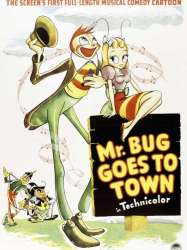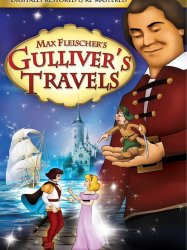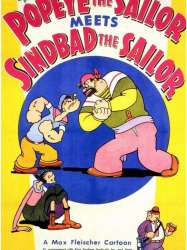Fleischer Studios

- Infos
- Best films
If you like this company, let us know!
Fleischer Studios, Inc., was an American corporation which originated as an animation studio located at 1600 Broadway, New York City, New York. It was founded in 1921 as Inkwell Studios (or Out of the Inkwell Films) by brothers Max Fleischer and Dave Fleischer who ran the company from its inception until Paramount Pictures, the studio's parent company and the distributor of its films, forced them to resign in April 1942. In its prime, it was Walt Disney Productions's very first significant competitor and is notable for bringing to the screen cartoons featuring Koko the Clown, Betty Boop, Bimbo, Popeye the Sailor, and Superman. Unlike other studios, whose most famous characters were anthropomorphic animals, the Fleischers' most popular characters were humans.
Filmography of Fleischer Studios (13 films)
Production

Mr. Bug Goes to Town (1941)
, 1h17Directed by Shamus Culhane, Dave Fleischer, Al Eugster
Origin USA
Genres Comedy, Musical theatre, Fantasy, Musical, Animation
Themes Films about animals, Feminist films, Films about music and musicians, Films about insects, Musical films, Political films, Children's films
Actors Jack Mercer, Jean Rhys, Tedd Pierce, Pinto Colvig, Marjorie Hines, Guinn "Big Boy" Williams
Les amours de Hoppity le criquet et Douce, la fille d'un bourdon, sont troublées par la négligence des humains et le projet de construction d'un gratte-ciel sur leur territoire. L'héroïne est aussi menacée d'un mariage forcé avec Monsieur Scarabée.

Granite Hotel (1940)
Directed by Dave Fleischer
Origin USA
Genres Comedy, Animation
Actors Jack Mercer
Set in a modern stone-age time, the viewer is presented to a gallery of characters like a telephone operator, the ventriloquist "Edgar Burgundy" and his doll "Charlie Bacardi" (a play on Edgar Bergen and Charlie McCarthy) and a barber. A guest in need of a chess player calls the fire department who arrives riding a sauropod.

Gulliver's Travels (1939)
, 1h16Directed by Roland Dimon Crandall, Dave Fleischer, Max Fleischer, Seymour Kneitel, Grim Natwick
Origin USA
Genres Musical theatre, Action, Adventure, Musical, Animation
Themes Films about magic and magicians, Monde imaginaire, Musical films
Actors Pinto Colvig, Jack Mercer, Cal Howard, Tedd Pierce, Gus Wickie
On November 5, 1699, Gulliver (voiced by Sam Parker) washes onto Lilliput, after a shipwreck. While scouting the forest, the town crier 'Gabby' (voiced by Pinto Colvig), finds Gulliver unconscious body and rushes to warn the ruler of Lilliput, King Little (voiced by Jack Mercer). At this time, Little and his friend, King Bombo (voiced by Tedd Pierce) of Blefuscu, are signing a wedding contract, granting their children, Princess Glory of Lilliput (voiced by Jessica Dragonette) to Prince David of Blefuscu (voiced by Lanny Ross), permission to marry. When they argue over which song is to play at the wedding, Bombo declares war.

A Car-Tune Portrait (1937)
, 7minutesDirected by Dave Fleischer
Origin USA
Genres Musical, Animation
The cartoon features a lion dressed up as a musical conductor, attempting to keep his orchestra of animal musicians in order as they half-play, half-fight their way through the piece. Memorable moments include a Dachshund playing the xylophone using his back legs while the rest of him sleeps, a group of monkeys using a flute as a pea-shooter to fire at their fellow musicians, and a horse trombonist who attempts to swat a fly using his instrument but who only succeeds in hitting the dog trumpeter in front of him.
 , 17minutes
, 17minutesDirected by Dave Fleischer
Origin USA
Genres Comedy, Animation
Actors Jack Mercer, Mae Questel, Lou Fleischer, Gus Wickie
Popeye le marin, accompagné d'Olive Oyl et Wimpy, est envoyé pour arrêter le redoutable bandit Abu Hassan et sa force de quarante voleurs.
 , 8minutes
, 8minutesDirected by Dave Fleischer, Max Fleischer, Seymour Kneitel
Origin USA
Genres Comedy, Musical, Animation
Actors Jack Mercer, Mae Questel
Dans un orphelinat, les enfants sont tristes car ils ont reçu en cadeau des jouets cassés. Le professeur Grampy voit les enfants en passant dans son traîneau et a une idée pour leur offrir un joyeux Noël.
 , 17minutes
, 17minutesDirected by Dave Fleischer
Origin USA
Genres Comedy, Fantasy, Adventure, Musical, Animation
Actors Jack Mercer, Mae Questel, Lou Fleischer, Gus Wickie
Dans ce court métrage, Sindbad le marin se proclame « plus grand marin, aventurier et amant du monde ». Popeye le contredit par inadvertance, alors qu'il chante sa chanson habituelle en naviguant à portée de voix de l'île de Sindbad. Sindbad ordonne à son énorme rokh d'enlever la petite amie de Popeye, Olive Oyl, et détruit le vaisseau de Popeye, le forçant ainsi à nager jusqu'au rivage. Alors que Sinbad se délecte de faire d'Olive un trophée, il est interrompu par l'arrivée de Popeye, qu'il défie ensuite lors d'une série d'obstacles pour prouver sa grandeur. Popeye doit alors vaincre le rokh, un géant à deux têtes nommé Boola (une référence aux Trois Stooges) et, enfin, Sindbad lui-même. Grâce à sa fameuse boîte d'épinards, Popeye parviendra à vaincre Sindbad.

The Song of the Birds (1935)
, 7minutesOrigin USA
Genres Animation
Actors Gertrude Lawrence, Clarence Nash, Bill Thompson
Un enfant jouant avec un fusil vient à tirer sur un oisillon. Prenant conscience de son acte, l'enfant regrette très vite son geste. Par la suite, les autres oiseaux organisent des funérailles pour l'oisillon et l'enfant est déprimé de voir cela. Vers la fin de la cérémonie, la pluie se met à tomber et réanime le petit oiseau. Heureux de voir cela, l'enfant se débarrasse de son fusil et se réconcilie avec les oiseaux.

Crazy-Town (1932)
, 7minutesDirected by Dave Fleischer
Origin USA
Genres Comedy, Animation
Themes Musical films
Actors Mae Questel, Billy Murray, Mary Moder
Betty and Bimbo take a trip to Crazytown for a small vacation where anything can happen. They arrive on a train that acts like a horse. Mice are roaring & birds swim in the lake while fish fly in the air. Hats are worn on feet & shoes on heads, while banana peels are eaten instead of the banana.

My Old Kentucky Home (1926)
Directed by Dave Fleischer, Dick Huemer
Origin USA
Genres Musical, Animation
Themes Musical films
Actors Julia Swayne Gordon, Monte Blue, Frank Currier, Arthur Edmund Carewe
 Connection
Connection
